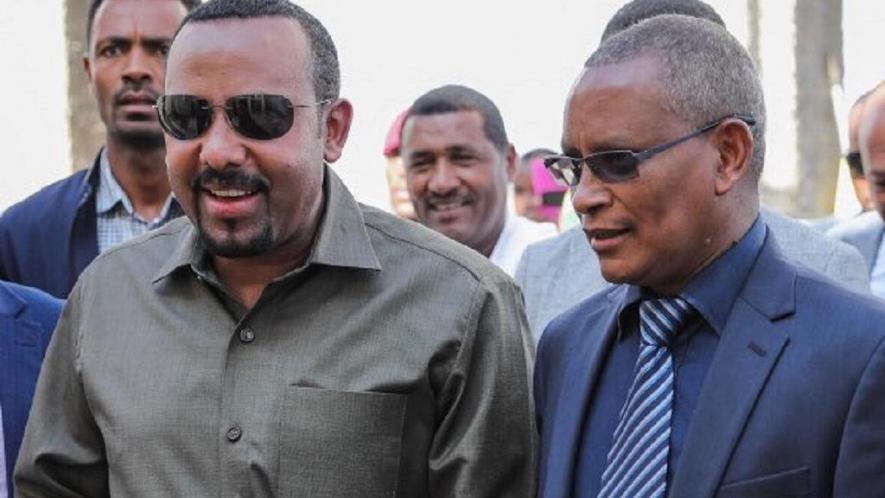As Conflict in Ethiopia Continues, Observers Fear Return of Repressive State

Credit : Africa News
Observers fear the reversal of hard-won reforms and the return of the repressive state as the war in the Tigray region in the northern end of Ethiopia continued into its second week on Thursday, November 12.
The troops of the Prime Minister Abiy Ahmed-led federal government and those of the Tigray regional government led by the Tigray People’s Liberation Front (TPLF) — both of which have deemed the other illegitimate — have been fighting in this region bordering Eritrea since November 4.
Accusing the Tigrayan troops of attacking a base of the federal government in the city of Mekelle, the PM has vowed to continue the campaign and refused to negotiate until the TPLF has been disarmed and removed from power, and the authority of the federal government has been restored.
This insistence of Abiy Ahmed has now begun to risk the civil rights gains that were made in Ethiopia after the reforms he himself had initiated.
“Prior to 2018, no political parties were allowed to operate outside the ruling coalition which was dominated at the time by the TPLF. Just being an ordinary blogger or journalist could land one in jail,” Emmanuel (name changed due to security concerns), a journalist based in the capital city Addis Ababa, told Peoples Dispatch.
“At the time, other ethnic groupings in Ethiopia, including the Oromos who make up the majority, felt oppressed by the Tigrayans,” he said.
Soon after coming to power as a reformer on the back of the anti-government protests in 2018 demanding civil liberties, Abiy Ahmed undertook “sweeping reforms”. At once, “he opened up the political space, freed political prisoners and allowed other political parties to operate,” Emmanuel added.
However, his efforts to transcend the historic ethnic divisions in Ethiopia and create a united nation state has been met with fierce resistance, including from a section of Oromo ethnic grouping from which he hails. While being a majority, this group has always felt marginalized by different ethnic groupings in different periods of Ethiopian history.
After the TPLF was cornered following the ascent of Abiy Ahmed, a section of the Oromo expected him to enforce an Oromiya identity on Ethiopia.
“Abiy doesn’t care about his ethnicity and regards himself as an Ethiopian nationalist. But his concept of ‘One Ethiopia’ is an ideal which has never been a reality,” he said, explaining that Ethiopia has always been a loose federation of ethno-nationalist regional governments, with varying degrees of autonomy. Each has its own armed forces and militias.
To mitigate against this reality, he took the “bold step” of dissolving the Ethiopian People’s Revolutionary Democratic Front, which was a coalition of multiple ethnically organized political parties, and merged them into a single Prosperity Party.
This won him the enmity, not only of the TPLF which refused to dissolve, but also of a section of Oromos who resorted to violent protests using the very political space he had opened up through reforms.
With the federal government now accusing this group of collaborating with the TPLF, Emmanuel fears a slide back towards authoritarianism. On the very day the military conflict started in Tigray, Bekalu Alamrew, a broadcast journalist working for the privately-owned Awlo Media Center, was arrested on a number of vague accusations, including that he had contact with the TPLF.
According to the human rights commission appointed by the federal government, a total of six journalists have been arrested since the conflict started. “This trend is a dangerous reversal of the early steps taken by Prime Minister Abiy Ahmed’s government to improve press freedom,” said Muthoki Mumo, Sub-Saharan Africa representative of the Committee to Protect Journalists (CPJ).
Some other people of Tigrayan ethnicity have also been arrested from Addis Ababa by the national intelligence, which suspects them of collaborating with the Tigray regional government, Emmanuel said.
The State-controlled media also reported that “17 military officers have been arrested for creating fertile ground” for the TPLF to launch attacks on the federal troops in the conflict region. They have been charged with treason.
State repression now is nowhere close to what used to be in pre-Abiy years in Ethiopia, Emmanuel clarifies. However, if the conflict continues to escalate, reversal of his reforms and return to authoritarianism is not a possibility to be discounted.
Get the latest reports & analysis with people's perspective on Protests, movements & deep analytical videos, discussions of the current affairs in your Telegram app. Subscribe to NewsClick's Telegram channel & get Real-Time updates on stories, as they get published on our website.














